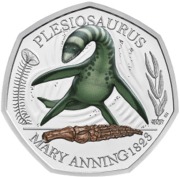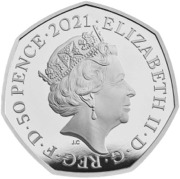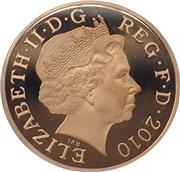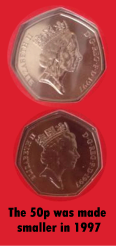 The 2021 50 Pence Coin - Mary Anning Collection: Plesiosaurus (Colourised)
The 2021 50 Pence Coin - Mary Anning Collection: Plesiosaurus (Colourised)The second coin of the Mary Anning Collection released in 2021 is the Plesiosaurus.
The Plesiosaurus lived in the early part of the Jurassic Period (about 208-66 million years ago). They weighed about 450kg and were about 3.5m long. Skeletons have been found around England.
The Mary Anning Collection of 50p coins is part of the Royal Mint Tales of the Earth series. Mary Anning (1799-1847) was an English fossil collector, dealer and palaeontologist. She discovered many marine fossils from the Jurassic period by searching the cliffs around the English Channel in Dorset (England). Mary's discoveries helped form the scientific thinking behind prehistoric life history.
The Reverse shows an image of the Plesiosaurus and was designed by Robert Nicholls.
Three coins are in this collection, which are available as BU, Silver or Gold, and with a colourised options too. The coins depict the Temnodontosaurus, Plesiosaurus and Dimorphodon, and are available as a set and individual coins.
These coins are available (subject to stock) from the Royal Mint Shop
 The Obverse shows a portrait of Queen Elizabeth II by Jody Clark.
The Obverse shows a portrait of Queen Elizabeth II by Jody Clark.Coin shown is the silver proof colour version and the limited edition is set as 700 coins.
Image Credit: The Royal Mint.
Mintage: Not known
Silver Proof: 7,000
Minted at The Royal Mint
Below are some coins currently being offered on eBay. As an eBay Partner, We may be compensated if you make a purchase.
 Queen Elizabeth II was the longest reigning British Monarch ever, reigning for over 70 years. Born on 21 April 1926 to King George VI and Elizabeth Bowes-Lyon, she became Queen in 1952 and her Coronation was on 2 June 1953. She died on 8 September 2022. Some coins were released dated 2023.
Queen Elizabeth II was the longest reigning British Monarch ever, reigning for over 70 years. Born on 21 April 1926 to King George VI and Elizabeth Bowes-Lyon, she became Queen in 1952 and her Coronation was on 2 June 1953. She died on 8 September 2022. Some coins were released dated 2023.Queen Elizabeth II issued many coins and was monarch during decimalisation. She married Prince Philip, Duke of Edinburgh in 1947 and had four children. Her eldest son succeeded the throne as King Charles III. House of Windsor.
The British Fifty Pence (50p) coin was introduced in October 1969 as part of the decimalisation of the British currency. It replaced the 10 shilling note, both being equivalent to half of one pound (£0.50). It is colloquially called the '50 pee'. The coin has 7 sides (heptagonal) but has rounded corners on each apex so that the coin will roll and work in vending machines.  Originally, the coin has a diameter of 30mm and weighed 13.5g, but in 1997 this was replaced with a smaller version of diameter 27.3mm and weight of 8g. The thickness was kept at 1.78mm. The coin is made of Cupro-Nickel (75% copper, 25% nickel). The larger version was demonitised (i.e. ceased to be legal tender) in 1998.
Originally, the coin has a diameter of 30mm and weighed 13.5g, but in 1997 this was replaced with a smaller version of diameter 27.3mm and weight of 8g. The thickness was kept at 1.78mm. The coin is made of Cupro-Nickel (75% copper, 25% nickel). The larger version was demonitised (i.e. ceased to be legal tender) in 1998.
There are four versions of the portrait of Queen Elizabeth II:
- 1969-1984 - Designer: Arnold Machin
- 1985-1997 - Designer: Raphael Maklouf
- 1998-2015 - Designer: Ian Rank-Broadley FRBS
- 2015-2022 - Designer: Jody Clark
There are also 29 different variants which were minted in 2011 in celebration of the 2012 Summer Olympics.
Formed in the reign of Alfred the Great about the year 886, during the period 1279-1812 it was generally referred to as The Tower Mint as it was housed at the Tower of London. The Master of The Royal Mint has included famous figures such as Sir Isaac Newton.
Since 2010 it has operated as Royal Mint Ltd, a company owned by HM Treasury, under an exclusive contract to supply all coinage for the UK although it also produces medals and coins for other countries. It is currently located at Llantrisant, Wales.
The orignal coinage was Pounds, Shillings and Pence but since decimalisation on 15 February 1971, it is £1 = 100p, that is One Pound = 100 pence. The coinage of the UK is also a long history, the Royal Mint being established as long ago as 886AD when coins were hammered. Today there is perhaps 30 billion coins in circulation, and many (numismatic) collectors coins and sets are issued frequently in gold, silver and other metals.
As an eBay Partner, We may be compensated if you make a purchase.








